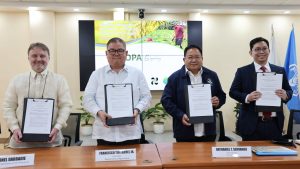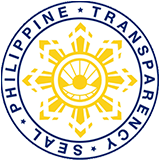
The signing of the tripartite Operational Partners Agreement for the USD 39.2-million (M) project between the Department of Agriculture (DA), the Philippine Atmospheric, Geophysical, and Astronomical Services Administration of the Department of Science and Technology (DOST-PAGASA), the Food and Agriculture Organization of the United Nations (FAO), and the Bureau of Treasury (BTr) signals the official implementation of the Adapting Philippine Agriculture to Climate Change (APA) project, benefiting 1.25-M farmers in the climate-vulnerable regions in the country.
Signed by DA Secretary Francisco P. Tiu Laurel, Jr., DOST-PAGASA Administrator Dr. Nathaniel T. Servando, FAO Representative in the Philippines
Dr. Lionel V. Dabbadie, and BTr Deputy Treasurer Mr. Eduardo Anthony Mariño III on September 17, 2024, this seven-year initiative aims to boost the resilience of rural communities reliant on agriculture. The project spans five regions, nine provinces, and 100 municipalities across the country.
A key outcome of the project is the adoption of climate-resilient farming practices by farmers, empowering them to establish sustainable enterprises. The project also aims to strengthen regulatory frameworks, enhance market systems, and improve knowledge management to mainstream and scale up climate-resilient agriculture across the country.
“Our combined efforts in implementing the APA Project will strengthen the foundation of progressive and resilient communities that we have begun through our various climate-resiliency-building initiatives under AMIA and other DA programs,” he said.
With a foundation built over a decade, the Department’s flagship climate change program, the Adaptation and Mitigation Initiative in Agriculture (AMIA), developed a community-based resiliency model. This program, alongside the Disaster Risk Reduction and Management (DRRM) section, has contributed to various important developments, such as digitization and knowledge management, thorough field validation of damages and losses, the application of Unmanned Aerial Systems (UAS) for DRRM, and improvements in information management and public awareness initiatives. These efforts are coordinated by the Field Operations Service (FOS), which acts as the National Program Management Office (NPMO) for the APA project.
With the initiatives undertaken by the department, Secretary Laurel described the APA Project as an expansion and intensification of these efforts to better assist the Filipino farmers.
As one of the most climate-risk countries in the world, the Philippines continues to face frequent and catastrophic extreme weather events, such as tropical cyclones, droughts, floods, and irregular precipitation that threaten both the livelihoods of Filipino farmers and the food security of millions of people.
Dr. Lionel Dabbadie, FAO Representative in the Philippines, emphasized the broader impact of the APA Project, highlighting its long-term benefits for both farmers and the nation.
“It’s about directly benefiting 250,000 farmers, translating to a total benefit of 1.25 million individuals (with 5 members per household), and indirectly helping millions more not only to adapt but also to lead with innovation and resilience. It’s about creating opportunities for growth in the fields and through agricultural enterprises, ensuring that future generations continue to benefit from the rich agricultural heritage of the Philippines—a nation sustained by farming for centuries,” he explained.
The total project cost amounts to USD 39.2 million, financed by a Green Climate Fund (GCF) grant of USD 26.3 million and co-financed by the Philippine government with USD 12.9 million. The Department of Finance serves as the Philippines’ National Designated Authority to the GCF. ### (Ira Y. Cruz, DA-AFID)
Author: DA-AFID | 19 September 2024


